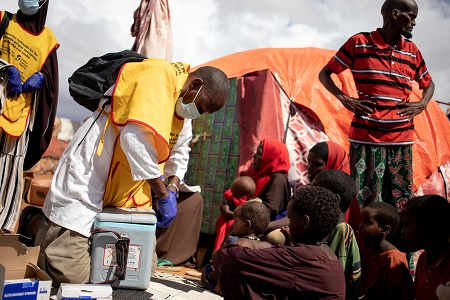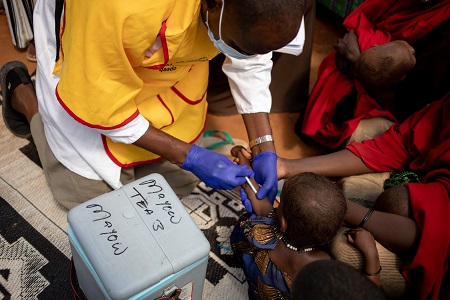27 June 2022 – When young Nastexo and Salmo developed high fevers, coughs, sore throats, runny noses and watery eyes, Ilmo may not have known exactly what problem her children had, but their rashes gave it away. Ilmo, who lives in a drought-affected location in Baidoa, knew her children had measles as she had seen many cases recently and had learnt to look out for these symptoms.
Ilmo felt helpless and tired when they both fell sick with this highly contagious disease, as they needed her undivided attention. Upon receiving advice from community health workers, she took Nastexo and Salmo to a health facility nearby where a doctor gave them vitamin A to boost their immunity and medication to give them relief.
 Health workers use vaccine carriers to store measles vaccines at the optimum temperature while visiting children to vaccinate them during house-to-house visits in the Istanbul IDP camp in Kismayo, Jubbaland state (April 2022). Credit: WHO Somalia/AreteIn collaboration with the Federal Ministry of Health and Human Services and partners, the World Health Organization (WHO) is supporting the work of 2163 community health workers who visit around 300 000 households every month across Somalia to look out for sick children in the households whose parents do not visit the health centres to seek health care for their sick children owing to myriad of reasons. These community health workers, deployed by WHO in the worst affected areas, look for sick children with suspected measles, pneumonia, diarrhoea or suspected cholera and malaria. They also screen children for signs of acute malnutrition using mid-upper arm circumference measuring tapes and search for other unusual health events in the community. This regular search helps communities to seek health care in a timely manner, which saves lives.
Health workers use vaccine carriers to store measles vaccines at the optimum temperature while visiting children to vaccinate them during house-to-house visits in the Istanbul IDP camp in Kismayo, Jubbaland state (April 2022). Credit: WHO Somalia/AreteIn collaboration with the Federal Ministry of Health and Human Services and partners, the World Health Organization (WHO) is supporting the work of 2163 community health workers who visit around 300 000 households every month across Somalia to look out for sick children in the households whose parents do not visit the health centres to seek health care for their sick children owing to myriad of reasons. These community health workers, deployed by WHO in the worst affected areas, look for sick children with suspected measles, pneumonia, diarrhoea or suspected cholera and malaria. They also screen children for signs of acute malnutrition using mid-upper arm circumference measuring tapes and search for other unusual health events in the community. This regular search helps communities to seek health care in a timely manner, which saves lives.
Hunger setting the stage for measles spread
The ongoing drought in the Horn of Africa, which WHO recently classified as a grade three health emergency – meaning that it is a severe crisis – is leaving children weak, hungry and susceptible to disease. Out of 6.1 million people across the country who are food insecure, nearly 1.7 million are suffering from extreme levels of hunger. An estimated 1.4 million children aged under 5 and more than 250 000 pregnant and lactating women will need treatment and care for malnutrition.
From the beginning of the year until week 21 of 2022 (29 May 2022), health facilities and community health workers reported 9562 suspected cases of measles, 7650 (80%) of whom are aged under 5 years. The highest number of cases have been reported from Puntland, South West State and Banadir.
“We are going extra miles to reach out every child whose life can be saved and protected by measles and other vaccines. During the last 4 months of our intensified operation in the ground, over 92 000 children have been vaccinated against childhood vaccines including measles through our outreach services which we have supported and continue to support in the drought-affected districts. Approximately 19000 of these children were identified by our health workers as “zero dose children”, meaning that they have not received any vaccine in their life span. Unvaccinated children, coupled with malnutrition and mass displacement, will set the stage for diseases like measles to spread. Therefore, we are reaching to every child in these drought-affected districts and vaccinate them against measles and other childhood vaccines. In order to continue to maintain our life-saving interventions, we will need US$ 35 million to ramp up our operations until the end of 2022,” said Dr Mamunur Rahman Malik, WHO Representative to Somalia.
Realizing the benefits of vaccination
 Ali Aden, a health worker, vaccinates children against measles at the Istanbul IDP camp in Kismayo, Jubbaland state (April 2022). Credit: WHO Somalia/AreteIlmo explains that she never had the chance to take Nastexo and Salmo for their childhood vaccinations, but now knows how important it is to vaccinate children. She explains that she will take the newest addition to the family, her 7-month-old baby, to receive routine childhood vaccinations to prevent him from falling sick like his siblings.
Ali Aden, a health worker, vaccinates children against measles at the Istanbul IDP camp in Kismayo, Jubbaland state (April 2022). Credit: WHO Somalia/AreteIlmo explains that she never had the chance to take Nastexo and Salmo for their childhood vaccinations, but now knows how important it is to vaccinate children. She explains that she will take the newest addition to the family, her 7-month-old baby, to receive routine childhood vaccinations to prevent him from falling sick like his siblings.
The ongoing drought in Somalia is taking a toll on the livelihoods and health of millions of Somalis. As casual labourers, Ilmo and her husband do not earn much. Since the drought began, they have found it even harder to find jobs to make a living, and now with two children unwell, they were recently forced to live on one meal a day. Ilmo’s children were lucky enough to get attention, but there are children who do not receive timely support, as well as more families that are plunged into poverty as a result of trying to address their health needs.









